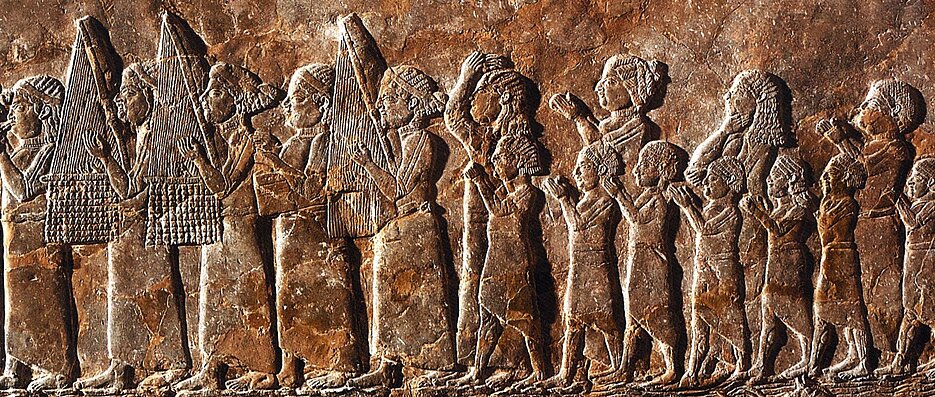Tonal Systems and Music Notation 20.–22.9.2018
09/03/2018Interdisziplinäre Tagung zu Tonsystemen und Musiknotation im alten Kulturen
Konferenz
Tonal Systems and Music Notation in Mesopotamian and Related Cultures
20.-22. September 2018
Organisation: Dahlia Shehata (Würzburg; Stefan Hagel (Wien)
Aus Mesopotamien stammen nicht nur die ältesten Zeugnisse für ein sprachlich fixiertes Tonsystem, sondern auch eine Art rudimentäre „Musiknotation“, die vornehmlich in der multikulturellen Umgebung des spätbronzezeitlichen Ugarit Anwendung fand.
Ziel der Tagung ist die Prüfung und Evaluierung bisheriger und neuer Deutungsversuche der keilschriftlichen Quellen sowie der aus materiellen Hinterlassenschaften zu eruierenden Informationen zu Tonsystemen und „Notationen“ im Alten Orient. Einmalig ist hierbei die interdisziplinäre Herangehensweise. So werden vergleichsmethodologisch benachbarte und analoge Kulturen, darunter auch Nachfolgekulturen (Griechenland, die ‚islamische‘ Welt von den frühesten Zeugnissen bis zum modernen Orient, Indien) einbezogen, die nicht westlichen Auffassungsweisen entsprechen. Über die Beteiligung von Fachleuten auf dem Gebiet vorneuzeitlicher Musiknotation und Tonalität soll zudem der Versuch unternommen werden, eine auch fachextern anwendbare Definition der vorliegenden Systeme zu erarbeiten.
Interessierte Studierende und Gäste sind herzlich eingeladen, den Vorträgen und Diskussionen im Workshop beizuwohnen.
Programm
Thursday, September 20th
14:00 Introduction: Stefan Hagel / Dahlia Shehata
1st Panel Understanding ‘music’ in terms of instruments
14:30 Ricardo Eichmann (Berlin): What does the study of ancient Egyptian Lutes (Pharaonic and Coptic period) contribute to the reconstruction of musical scales and intervals?
15:00 Barnaby Brown & Stef Connor (Cambridge): Instrument scales and musical scales: interpreting doublepipe finds from Ur, Poseidonia and Pydna
16:00 Jay Rahn (Toronto): Tuning by ear in antiquity: Acoustics of plucked strings and closed pipes
16:30 Yasemin Gökpınar (Frankfurt): Some notes on woodwind instruments in al-Fārābī’s Kitāb al-Mūsīqī al-kabīr
Friday, September 21st
2nd Panel Understanding ‘music’ in terms of notation
09:30 Andreas Haug (Würzburg): Introductory remarks concerning the ‘notation’ of ‘music’ in pre-modern textual cultures
10:00 Jürgen Ruck & Hansjörg Ewert (Würzburg): Reading music - fingered text
11:00 Ulrike-Rebekka Nieten (Berlin): The notation of the Syriac-Aramaic accents and their influence upon the Jewish-, Samaritan- and Ethiopic musical tradition
11:30 Sam Mirelman (London): The rhetorical function of Late Babylonian performative indications
3rd Panel Understanding ‘musical’ conceptions of the Ancient Near East
14:00 Stefan Hagel (Wien): Cyclic centricity, Hellenocentricity or what to centre on?
14:30 Richard Dumbrill (London): Tonal morphology in the Ancient Near-East: Interval polarity; linearity and cyclicity
15:00 John Franklin & Sara de Rose (Vermont): Examination of Sara de Rose’s proposed link between CBS 1776 and UET VII 74
16:00 Jerome Colburn (Champaign): New Views of RŠ h. 6: Text, interpretation, and musical setting
16:30 Thomas Richter (Frankfurt): Die hurritischen 'Musik-Texte' aus Ugarit – 50 Jahre später
Saturday, September 22nd
4th Panel Understanding past ‘musics’ as a historical process
09:30 Dahlia Shehata (Würzburg): Mesopotamia’s tonality and ‘music notation’ systems: Surveying beginnings, developments, and historical distribution
10:00 Salah Eddin Maraqa (Münster): Western notation and changes in modal structure in the eastern Arab world
10:30 Jacob Olley (Münster): Changes in the tonal system of Ottoman music as reflected in notated manuscripts, ca. 1700–1900
For more information please contact: dahlia.shehata@uni-wuerzburg.de
Teilnehmer*innen: Barnaby Brown (Cambridge), Jerome Colburn (Champaign), Stef Conner (Cambridge), Richard Dumbrill (London), Ricardo Eichmann (Berlin), Hansjörg Ewert (Würzburg), John Franklin (Vermont), Yasemin Gökpınar (Bochum), Andreas Haug (Würzburg), Salah-Eddin Maraqah (Münster), Sam Mirelman (Heidelberg/London), Rebekka Nieten (Berlin), Jacob Olley (Münster), Jay Rahn (Toronto), Thomas Richter (Frankfurt), Jürgen Ruck (Würzburg)



